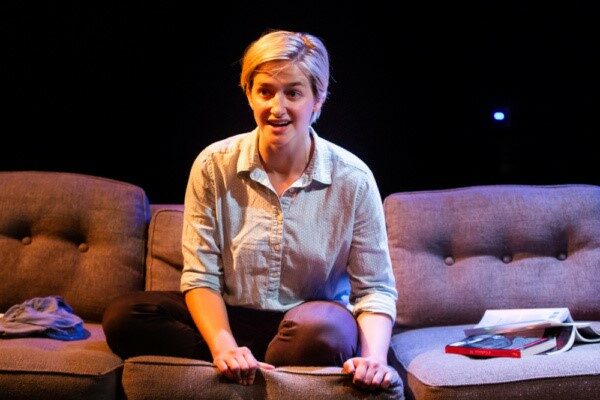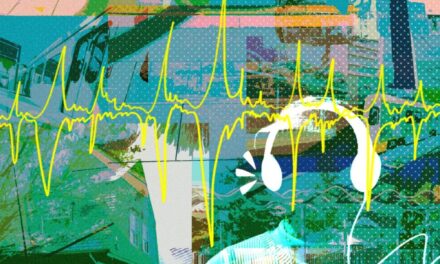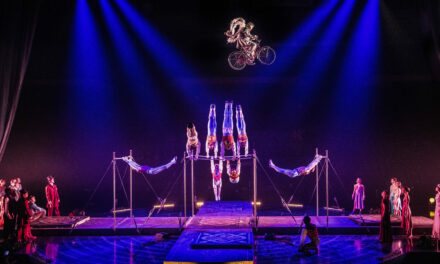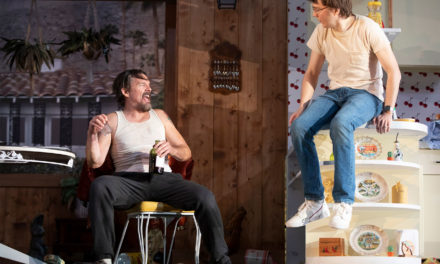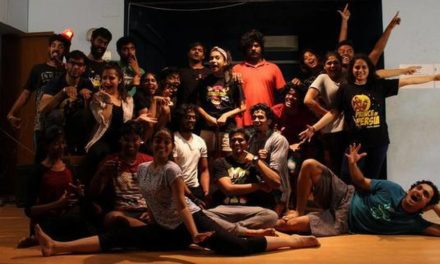Ellenor Riley-Condit is an actor, producer, creator, and artistic director of The Syndicate. She travels between New York where her company is based, and Chicago, where she is currently pursuing a MFA in interdisciplinary arts at Goddard College. Ellie met all the members of The Syndicate at the SITI company, where they studied in Anne Bogart’s Viewpoints and the Suzuki method. Ellie believes in creating works devised by an ensemble, and the power of being in a group of collaborators who constantly push and support one another. Her favorite shows are the ones where she can tell that everyone involved is “chasing after something new.”
The Syndicate is an ensemble theater company that produces new plays by women, queer artists, and trans artists. Their work promotes diversity, both in how they tell stories and which particular stories they choose to tell. The Syndicate just completed their annual festival “Syndicated” in downtown NYC. This year featured the piece Bluets in which Ellie and other company members adapted Maggie Nelson’s book of the same name. This was a solo piece, meaning Ellie carried the show by herself night after night. The festival also features “first reads” of three new works.
I had the pleasure of working with Ellie this past summer at Powerhouse Theater where she has worked for six summers. She assistant directed our unique production of Shakespeare’s Measure For Measure. She did such a thorough job helping us actors understand how deeply the script relates to today’s world. She also helped us make commentary on the piece while still doing justice to the script. I also took her Movement class, in which we focused on how movement and shapes are perceived, how we tell stories with only our bodies and our environment, and the theory of Viewpoints.
Emma: I’d like to start off with your most recent work. You just completed the First Read new play development workshop as part of your festival, Syndicated. Of the submissions you receive, how do you go about choosing which plays you decide to put up? What aspects do you look for when you are choosing a new play?
Ellie: Oh Wow. Well, I chose the plays with other members of my company, and I guess we were looking for an early draft, something that we can see the potential in, whether that’s through a particular subject the writers tackling or if there’s something maybe exciting about what they’re doing with the structure of the play or the characters where there’s some part is really developed and exciting. But it still might need a few more drafts to be ready for production. And you know, the Syndicate as a group of people, really enjoy plays that work outside of the confines of realism or naturalism. So we were definitely looking for something other than what you might call a living room play. There is usually some element of magical realism that is outside of the everyday. One of the plays that we picked was called The Desert Play Or Nothing Feels Like, and what really appealed to us about that script is it is set in the middle of the desert in this sort of surreal town where there’s this group of women who work in a brothel and speak as a chorus and they do all this really cool stuff with sand. There’s always sand present, and they move as this sculpture transporting sand around the set. It’s a really incredible theatrical gesture and we were really excited to figure out what it meant. So, I guess long story short would be an element of the extraordinary. And then I’m looking at where the writer is in the process. It should be early on, but also showing some promise, which can be tricky to gauge. But you know, you give it a try.
Emma: Wow I wish I could have seen it! So, for a different show, Bluets, in the same festival, you worked as a solo artist. What about Maggie Nelson’s work inspires you and why did you choose Bluets, in particular, to adapt for the stage. Was it difficult being the only performer on stage?
Ellie: It’s crazy. I’ve never done a solo show before but I guess maybe it’s the right of passage or maybe it’s just something that you do if you really like to hear yourself talk (laughs). But it genuinely made me feel like throwing up every time. And it was amazing and exhilarating, but I would get the cue for places and I’d think, I don’t know if I can do this. And then you remember that you just have to trust all of the things that you usually trust when there are other people there on stage with you. And the trick is, at least in the case of this performance, the audience is your scene partner. They’re who you work with. I’m hoping to be able to do it again next year in Chicago. I don’t know if it’s going to ever get any less terrifying, but I guess it’s good for me as long as it’s not painfully terrifying, which I think it just toes that line. And Maggie Nelson for me is one of the most important writers today. So many of her other books are so theoretical and more academic and jargony. It might be more difficult to adapt her other works. But in this one, the imagery is so rich and it weaves together things that are so personal. And there are these big sweeping ideas about what art is and what creation is and how we perceive things, individual perception, through the lens of color. She’s talking about color a lot. I admire her ability to take all of these seemingly different topics and pull them together. Also, quite frankly, I didn’t know at first if it was even possible to make it theatrical because on the page it’s one thing, but when you speak the words out loud, like what are you trying to do? What is your action? What is your objective? What is your task? Right? It was like, okay, well, what’s the story? There is one on the page, but how does that translate? So just the challenge of attempting that was super exciting
Emma: So how did you end up incorporating color? Was it in terms of costume and set or just kind of more the symbolic emotion of the color.
Ellie: It was interesting because the set is actually really minimal. There was a couch, a table, a chair, a coffeemaker, and some books. It was mostly grays and browns. But I worked pretty closely with a video designer and we projected onto the back wall, over the course of the performance, a sunrise and then a sunset and it wasn’t realistic at all. It was this very saturated technicolor sort of crazy looking sun. there was this big sort of noon moment where it appeared that the sun was huge and as high as it could go. Then it started to set and it was meant to evoke all of these visceral responses to the really bright, intense color. So that’s kind of how we chose to bring color in. And I’d interact with the sun at different times and it becomes part of the journey of the character.
Emma: Ah, I see. So, having worked with you I know you work a lot with viewpoints and that they’re a huge part of your process. I was wondering how viewpoints come into play when you’re working on devising a piece, such as Bluets, but with your ensemble.
Ellie: We use both viewpoints and Suzuki training. We seriously believe that training doesn’t just happen when you’re onstage but that there needs to be other elements of practice to support you. You can’t just jump up on stage and be prepared to work on something. So viewpoints and Suzuki are two of the ways that we sort of warm-up if you will. And viewpoints especially we really use to sort of throw ideas at the wall and just see what sticks. So, you can start a viewpoint session before rehearsal and say okay, here are some elements of the blocking that we made. So there’s no rule about how you have to go through the scene. You can just play within that sort of framework of what the viewpoints offer and it can help break things open and keep you thinking outside of what is expected. We use it to keep everything moving and to generate new ideas.
Emma: And all members are accustomed to this style because you all trained at the SITI company. Right?
Ellie: Correct, yes. With Anne Bogart and SITI company.
Emma: That’s awesome. So, being a co-artistic director and an MFA student, which I can imagine keeps you very busy, why is it still important for you to teach? What have you learned from teaching?
Ellie: Teaching helps me because when I open my mouth in my classroom, whatever comes out is what I know I really care about. It really helps me boil down what I think is important and what I like to focus on in my own work. And it reminds me that there’s no such thing as being an expert, especially for performers. You’re living in the moment or, however you want to describe it, always chasing after “good acting.” And so to take something like introducing shape in a viewpoints class or even scene study or anything, when I teach I remember why it’s so important and I get a new lesson out of it every time. It’s kind of cheesy, but it helps you not forget why you do what you do.
Emma: I love that. I would love to teach someday, so that’s super cool to hear. And when you’re not teaching, how do you use concepts of dance and visual art in the process of creating theater? How much of an impact do these other aspects of art have on your storytelling method?
Ellie: That’s interesting. The main thing that I focus on in developing any new work is just making sure that–and I yelled about this all the time in class–that even if you’re using text that it’s not always the most important thing. Yes, text is lovely and the script is important. But creating moments by delving into the physical life of a play, or using other forms of art, this is sort of where I find the most excitement or spark. We need to not take stage picture for granted. Being able to step outside and see how all of the visual elements are lining up means that you can have a bigger impact than just like, am I feeling this feeling or am I saying this line correctly? By studying postmodern art, visual art, performance art, and dance, the way that those artists are putting a story together, it can remind us not to give text all the power. Bodies and shapes and relationship to an object can mean just as much as a sentence.
Emma: So does that mean when you get a new text you look at movement before analyzing the text or do you look at the text first and then start moving.
Ellie: It depends. It really does. And that’s one of the tricky things about devising work or working on new scripts. There is no roadmap like there is in traditional theater. In a traditional setting, we get a script, we sit around the table, we read it, we talk about it, we start staging, we do the thing, and then the next thing and there’s sort of a path. But if you’re approaching things in a different way it takes longer than a traditional rehearsal process because you have to ask the exact question you asked me. What’s the way in? Sometimes there’s a big section of stage directions, like in the middle of the script. Like, great, let’s improvise with that before we even try any of the words. That’s certainly happened. But there are also times when going through the text and doing normal dramaturgy is the way in. But starting from different sides of the process can really help unlock new ideas
Emma: Ah, I see. So, having used these techniques you just told me about in both Chicago and NYC, how does the theater process/world differ? Which do you prefer and why?
Ellie: Oh man, that’s a loaded question. Well, they’re so different. I mean that’s a cop-out haha. It is true Chicago has these very specific influences from the seventies and eighties of amazing method actors that have influenced so much of the culture. And there’s a lot of great small companies in storefronts just like, really carrying the paint off the walls with just amazing acting. And that’s a big part of the tradition, really getting into the nitty-gritty of human behavior and chasing after realism and big sweeping family dramas. There’s definitely that sort of flavor here. But then there’s also the influence of the Second City and all the improv, comedy, and clowning. There’s also so much experimental work that’s coming out of that as well, a little bit different from New York, which gets more of the international and postmodern artistic influences. And there are always going to be plays that originate in New York that will later be grabbed by Chicago theaters for their season. So I think Chicago is always going to have a little bit of a younger sibling complex in that way.
Emma: Chicago is a little less commercial than New York I would assume?
Ellie: Yeah, and obviously this happens in New York too, but in Chicago everybody knows everybody that does theater, like literally. And there’s not the same sense of like, oh, this person’s theater famous, you know? There’s just not. There’s just the community. That’s what it is here. But Chicago does have all of the taste and quality of New York, but then also this sort of small-town community feel sometimes, which is interesting.
Emma: I would definitely love to study there at some point.
Ellie: Tons of great schools and teachers here too.
Emma: LA is so different compared to NY too. I don’t know how I feel about it yet (laughs). Okay, another loaded question for you. Why is it your personal mission to tell an audience stories written by women, Queer people, and transgender people? What initially gave you this desire?
Ellie: Well, quite simply you get sick of not feeling represented. You get sick of people feeling like there’s only a handful of monologues that they can audition with. So how do we develop the new Canon? This is a big question for me. And how can I include more than just me, more than just my voice? Because that’s worth investing. How can I create opportunities for myself on stage while also inviting people in who are also underrepresented?
Emma: Yeah. I think it’s crazy that there are still so few plays written by women that are being produced compared to men. It’s like, come on people, this is theater.
Ellie: Yeah. I think there’s a play on Broadway or that’s in Seoul right now, that is the first all-female team and it’s just crazy that it took that long.
Emma: Well, better late than never I guess! Okay so speaking of females rising up in this industry: You are currently pursuing an MFA in Interdisciplinary Arts from Goddard College in which you get to study whatever interests you most. What are you choosing to do with this freedom?
Ellie: Hm. Good question. I’m looking at lots of different styles and performance theorists that look not only at what we’re literally putting up on stage but the social and political context. Especially through the feminist lens. This program really is choose your own adventure. I’m also looking at ideas from different social justice movements, ideas about trauma, sexual assault prevention and looking at ways of facilitating rehearsal rooms and classrooms in a more productive way. And with the “me too” movement and everything, people shouldn’t have to put themselves in harm’s way to be in an artistic process. So part of what I’m doing is not just about creating the plays and the different tools and artistic influences that help me. But it’s about how to run a room in a way that is both safe and productive.
Emma: Wow, so it really is like “design your own game plan”?
Ellie: Yeah. I mean it can be daunting because you’re like, wait, what am I studying? But then it’s also pretty awesome.
Emma: It definitely sounds awesome to me! So, I have one more question and I’m super excited to hear your take on it! What do you hope for an audience to take away from your shows?
Ellie: Oh Wow. Well, this may sound silly, but I just want people to feel like they couldn’t have had that experience anywhere else. There’s so much opportunity for other entertainment. And you know, we can sit in front of our screens all day and that’s totally valid. And obviously the golden age of television and all that. But if you go sit in a theater with other people, you should have to have physically been there. It should be something that you can only experience due to the intimacy of being together in the room. And there is a sense of like, I saw something magic and it was magic simply because people created it in front of me. And that magic can come from so many different styles, aesthetics, or subjects of story. But at the most basic level, I want people to feel like it was absolutely necessary to be in the room to have had that experience.
This post was written by the author in their personal capacity.The opinions expressed in this article are the author’s own and do not reflect the view of The Theatre Times, their staff or collaborators.
This post was written by Emma Kantor.
The views expressed here belong to the author and do not necessarily reflect our views and opinions.

